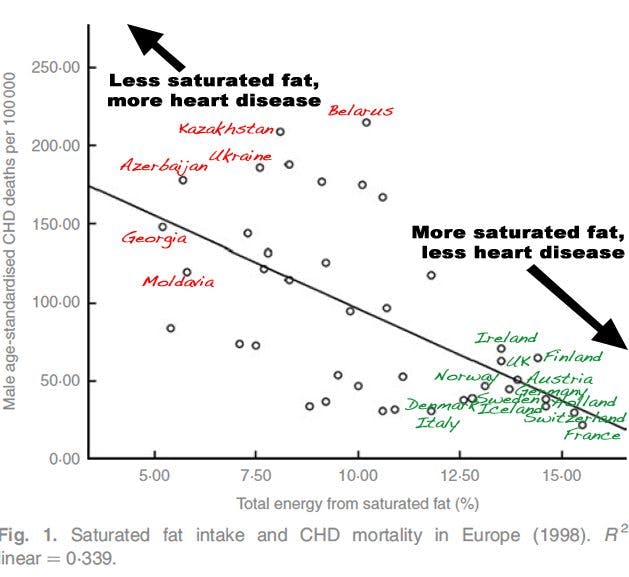Stunning: Saturated fat and the European paradox

Wow. This is mindblowing.
Have you heard about the French Paradox? French people traditionally eat a lot of saturated fat, like butter – yet they generally have less heart disease than other populations. A lot of brainpower has been wasted to explain this – does perhaps the red wine protect them?
But maybe it’s not really a paradox.
That’s it’s been seen as a paradox in the past is probably because older observational studies have shown weak associations between saturated fat consumption and increased risk of heart disease. However, there are many explanations for these findings, such as “the healthy user effect.” People who adhere to other health-related behaviors are also likely to avoid saturated fat because they’ve been told it is “unhealthy.” But there’s no way to know if their good health is due to avoiding saturated fat or is the result of all of those other behaviors – or caused by something else entirely.
That’s because observational studies can only show associations; they can’t show cause-effect relationships. There may be other factors besides dietary choices or health-related behaviors that cause the outcomes seen in these older studies.
I was just shown the diagram above, recently published in the journal Nutrition. It’s based on WHO and FAO statistics over the average intake of saturated fat in 41 European countries in 1998 (the latest available data), and the age-adjusted risk of dying from heart disease. I added some explanations.
More saturated fat, less heart disease
It’s a stunner. The French paradox is actually a French-Swiss-Icelandic-Swedish-German-Austrian-etc.-paradox!
- France eats the most saturated fat and has the lowest rate of heart disease deaths in all of Europe.
- Switzerland eats second-most saturated fat and has the second-lowest mortality.
- The countries eating more saturated fat have less heart disease, period.
Less saturated fat, more heart disease
And the countries eating less saturated fat? Like Georgia, Moldavia, Azerbaijan etc.? Well, they seem to have the highest mortality from heart disease in Europe.
It’s a Pan-European paradox now.



What does it mean?
Correlations between populations, like these, are known as ecological data. It doesn’t really prove anything. In other words, the diagram above does not prove that saturated fat protects you from heart disease. There are obviously many other differences between these populations, not just the intake of saturated fat.
But a diagram like this can provide a counter-argument to the observational studies mentioned above. It’s unlikely that saturated fat would be a major cause of deaths from heart disease, when European populations stuffing themselves with it have fewer deaths from heart disease, without exception.
Can this possibly be a weird coincidence? Can saturated fat still possibly be bad? What do you say?
PS
When I recently interviewed professor Loren Cordain about our hunter-gatherer ancestors, his guess was that they, on average, got about 15 percent of their calories from saturated fat.
If that’s true, it means that our genes should be well adapted to eating about 15 percent saturated fat. That’s more than twice as much as the maximum set in the advice from the USDA and others. Yet it is about as much as consumed by the populations in Europe today with the best heart health. Coincidence?
More: The Paleo Diet Explained